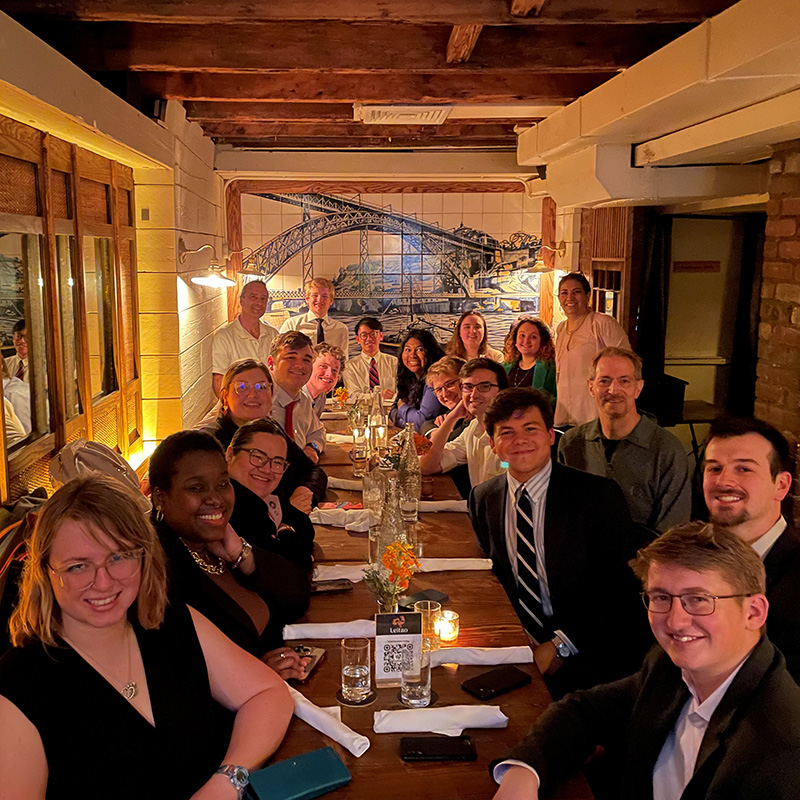MSU Texas Model UN team wins honors in NYC
For the sixth straight year the Midwestern State University Model United Nations team earned recognition at the national collegiate Model UN Conference held in March at the UN headquarters in New York City. The event draws teams from across the globe.
The MSU Texas team won a Distinguished Delegation Award, the second highest award. This is the sixth year in a row that the MSU Texas team earned one of the top two honors. The team also won four individual awards, a significant accomplishment.
Model UN is a learning simulation in which students role play the delegation of a country in the United Nations. This year MSU Texas represented the Portuguese Republic. The Portuguese Republic’s Permanent Mission at the United Nations hosted the team for a briefing. This was an exciting experience for the group as Portugal recently authored a UN resolution promoting Model UN in the international community. Team members met Vitorino Oliveira, one of the authors of this resolution, and he provided valuable insight into how best to represent Portugal in the international arena.
At the conference, students served on various committees organized by policy area, and they were charged with developing solutions to existing global problems such as developing early warning indicators for nuclear crises, empowering youth to accelerate development, promotion of sustainable tourism, and protecting displaced and refugee children, to mention just a few.
Model UN epitomizes the core mission of a Liberal Arts curriculum in that it is a multi-disciplinary activity requiring students to conduct independent research, critically examine a real world problem, develop a solution to this problem, and then convince their competitors that their solution is the most effective. This high-impact learning practice requires students to utilize research, critical thinking, communication, and, most importantly, leadership skills. To be successful students must speak publicly on their solution, build coalitions of supporters, as well as, develop a written resolution that is adopted by a majority of their committee and the larger General Assembly.
This team was again comprised of students from all six colleges and this multi-disciplinary make up was instrumental in the team’s success. Andrés Revis (Political Science/Global Studies major) served as head delegate. Student preparations began in the fall semester and included numerous hours of independent, extensive research and writing.
Students created position papers, one- or two-page documents representing Portugal’s position on key policy questions. MSU Texas earned three Outstanding Position Paper awards. Zetta Cannedy (Political Science) and Caroline Gomez (Political Science) won for their work in the General Assembly First committee for their paper on disarmament and development.
Madisyn Butler and Casee Harl (both Mass Communication) won in the Second General Assembly committee for their work on eradicating rural poverty.
Brandon Goins (English) and Federica Manno (Global Studies) were awarded for their work on protecting displaced and refugee children.
Revis and Colten Ellis (Accounting) were voted Outstanding Delegates for their work in committee by the International Atomic Energy Agency. The Outstanding Delegates then served as the keynote speakers, reporting on the

Back row L to R: Mackenize Andrade, Zetta Cannedy, Shane Chitwood, Quintan Ringwald, Rykir Evans, Colten Ellis, Brandon Goins, Austin Groth, and Jackson Redding
Middle Row L to R: Keynon Causey, Andres Revis, Caroline Gomez, Brandon Huynh, Madisyn Butler, and Federica Manno
Front Row L to R: Casee Harl, Steve Garrison (Advisor) and Maria Elliott (Advisor)
progress of their committee, during the Model UN General Assembly meeting. The Outstanding Delegate awards indicate that the committee participants viewed them as the most effective delegates in their session. This is a rare honor.
The student commitment at the conference was impressive as the proceedings begin with breakfast and typically do not end until well after midnight. To be successful a team must be present and actively involved in the proceedings. Achieving a Distinguished Delegation Award indicates that in each committee MSU Texas team members were actively involved in the proceedings at each step of the process. This recognition is a significant accomplishment given the level of competition. More than half of the attendees are from outside the U.S., and from much larger schools than MSU Texas. This accomplishment indicates that MSU Texas students are leaders among their peers at the international level.
2024 MSU Model United Nations Team
Dillard College of Business Administration
Colten Ellis, Accounting
Lamar D. Fain College of Fine Arts
Madisyn Butler, Mass Communication
Casee Harl, Mass Communication
Robert D. & Carol Gunn College of Health Sciences and Human Services
Quintan Ringwald, Respiratory Therapy
McCoy College of Science, Mathematics & Engineering
Shane Chitwood, Chemistry
Rykir Evans, Computer Science
Austin Groth, Chemistry
Brandon Huynh, Pre-Denistry
Prothro-Yeager College of Humanities & Social Sciences
Zetta Cannedy, Political Science
Keynon Causey, English
Brandon Goins, English
Caroline Gomez, Political Science
Federica Manno, Global Studies
Jackson Redding, Political Science
Andrés Revis, Political Science/Global Studies
Gordon T. & Ellen West College of Education
Mackenize Andrade, Education
